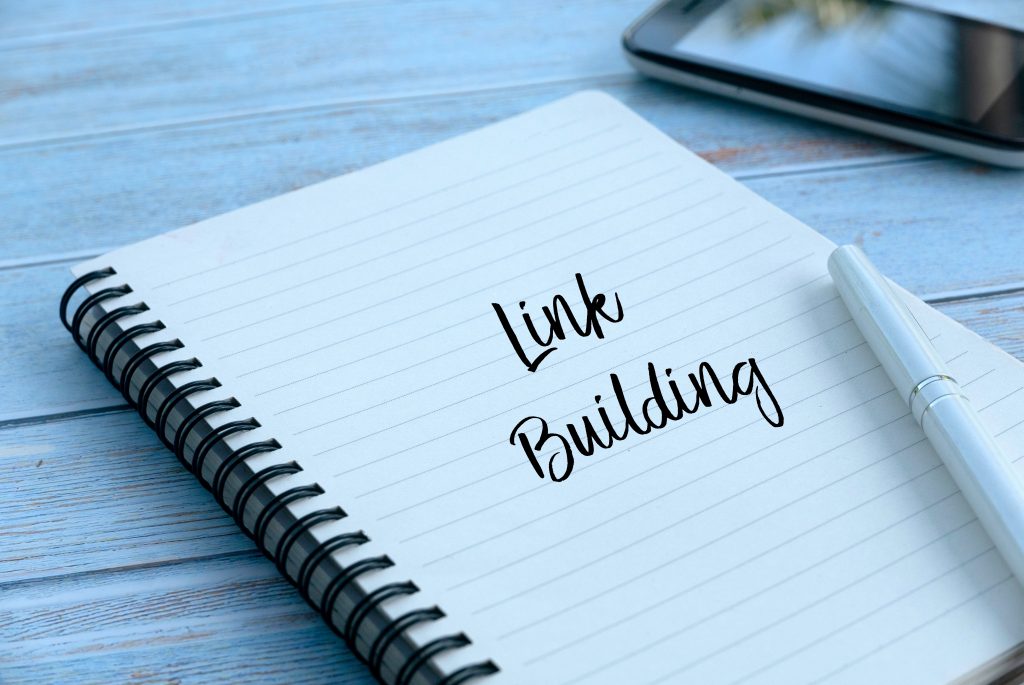In the vast realm of SEO, backlinks hold immense power. These virtual pathways connect different web pages, allowing search engines to evaluate their authority and relevance. But why are backlinks so vital? Well, they serve as votes of confidence from one website to another, indicating that the receiving site is a valuable resource. When a website accumulates high-quality backlinks, it signals to search engines that it is trustworthy and deserves higher visibility in search rankings.
To effectively build a strong link profile, there are several strategies to employ. Guest blogging allows you to contribute valuable content to authoritative sites in your industry, while earning an inbound link back to your own site. Influencer outreach helps you establish relationships with key figures in your niche, who can then share your content and provide valuable backlinks. Broken link building involves finding dead links on relevant websites and reaching out to offer an alternative link, not only benefiting the website owner but also gaining a valuable backlink in return. Additionally, promoting your content through social media and email newsletters can increase its visibility, encouraging others to link back to it.
Why Are Backlinks Important for SEO?
Backlinks play a crucial role in the success of any SEO optimisation strategy, as they provide important indications of confidence and relevance from external websites. They serve as valuable votes of confidence and relevance from external websites. Search engines, like Google, view backlinks as a crucial ranking signal, considering them as indicators of a website’s popularity, trustworthiness, and authority.
When a website receives high-quality backlinks from reputable sources, search engines interpret these as signals of the website’s credibility and importance in its respective niche. As a result, the website’s search engine rankings and organic visibility improve significantly.
Backlinks play a vital role in boosting a website’s online presence by increasing its chances of appearing on the first page of search engine results. This higher visibility translates into more organic traffic and exposure to a wider target audience.
However, it’s important to note that not all backlinks are created equal. Quality matters more than quantity. Search engines value backlinks from authoritative sites and relevant sources. Building a link profile with high-quality backlinks can greatly enhance the overall SEO efforts and contribute to the long-term success of a website.

Types of backlinks
There are different types of backlinks that are important for SEO. These include internal links, inbound links (or backlinks), and outbound links.
- Internal links are links that connect different pages within the same website. They are used to create a logical and organised structure within the site, making it easier for users to navigate and search engines to crawl. Internal links also help distribute link authority throughout the website, boosting the visibility and search rankings of all pages.
- Inbound links, also referred to as backlinks, are links that are directed towards a website from external sources. These links serve as indicators of the website’s credibility and significance. Search engines interpret backlinks from reputable and authoritative websites as signals of quality content, leading to higher search rankings.
- Outbound links refer to the links on a website that direct users to external sources. Although they do not directly impact a website’s SEO performance, they play a crucial role in building relationships with other websites and offering valuable resources for users. Outbound links should be strategic and relevant to the content, enhancing the user experience.
Each type of link contributes to a website’s SEO performance and search engine rankings in different ways. Internal links enhance website structure and help search engines understand the relationship between pages. Inbound links increase the website’s visibility and authority in search results. Outbound links contribute to the user experience and showcase the website’s credibility and quality.
Benefits of Backlinks in SEO
Backlinks play a crucial role in boosting a website’s SEO performance and providing numerous benefits. By incorporating backlinks into your SEO strategy, you can expect increased website visibility and higher rankings in search engine results. These authoritative links act as endorsements for your website and signal to search engines that your content is valuable and trustworthy.
As a result of having quality backlinks, you can also experience improved organic search traffic. When reputable websites link to your content, search engines view it as a vote of confidence and are more likely to rank your website higher in search results. This increased visibility helps drive more organic traffic to your site, resulting in a larger audience and potential customers.
Moreover, backlinks contribute to establishing higher credibility and authority for your website. When your content is referenced by authoritative sites in your industry, it signifies that your website is a trusted source of information. This reputation not only enhances your online presence but also instills trust in visitors, encouraging them to engage with your content and convert into customers.
Another benefit of backlinks is the potential for enhanced referral traffic. When visitors click on a backlink from another website, it directs them to your site, providing an opportunity to attract new visitors and potential customers. This referral traffic can be highly valuable as it comes from sources that are already interested in the content related to yours, increasing the likelihood of conversions.
Strategies for Effective Link Building
Building quality backlinks is a crucial aspect of any successful SEO strategy. By strategically acquiring high-quality backlinks, you can increase your website’s visibility, authority, and organic search traffic. However, effective link-building requires a well-thought-out approach that involves various strategies. Here are three key strategies to consider when implementing your link building efforts:
Guest Blogging
Guest blogging is a powerful strategy for building high-quality backlinks and increasing your website’s authority. To begin, research and identify authoritative sites in your niche that have a strong online presence and high search rankings. Look for sites with a significant social media following and engaging content.
Once you’ve found suitable sites, reach out to the editor or content creator. Craft a personalised and professional email expressing your interest in contributing a guest blog post. Highlight your expertise and the value you can provide to their audience. Make sure to follow any guidelines provided on their website regarding guest blog submissions.
The key here is to target high-ranking sites that not only generate social shares but also have a strong online reputation and audience engagement. By guest blogging on such sites, you can tap into their existing audience and increase your chances of attracting relevant traffic and backlinks. Additionally, these authoritative sites will add credibility and boost your own website’s authority in the eyes of search engines.
Remember, guest blogging is not just about backlinks; it’s about providing value to the audience and building relationships in your industry. Focus on offering helpful, well-researched content that aligns with the site’s audience and guidelines. By doing so, you’ll not only build quality backlinks but also gain exposure and establish yourself as an authority in your field.
Influencer Outreach
In the link-building process, influencer outreach plays a critical role in boosting credibility, increasing recognition, and acquiring valuable backlinks. By reaching out to industry influencers, businesses can tap into their established authority and engage with their loyal following.
When influencers mention or link to a website, it serves as a strong vote of confidence to search engines, indicating that the site is a reliable source of information. These valuable backlinks from authoritative influencers can significantly impact a website’s search rankings and visibility.
In addition to enhancing SEO efforts, influencer outreach helps build credibility. When reputable influencers endorse a brand or content, it instills trust and establishes the brand as an industry leader. This endorsement translates into increased recognition and a wider audience reach.
Incorporating influencer outreach into an overall link-building strategy has several benefits. Firstly, it allows businesses to tap into existing networks and communities that influencers have cultivated. This helps attract relevant traffic and increase the chances of acquiring valuable backlinks.
Secondly, by partnering with influencers, businesses can leverage their expertise and knowledge to create high-quality content that resonates with the target audience. This not only enhances the user experience but also attracts natural links from other relevant websites.
Overall, influencer outreach is an essential component of a successful link-building strategy. It helps businesses build credibility, increase recognition, and acquire valuable backlinks, thereby improving their search rankings and online presence in a meaningful way.
Broken Link Building
Broken link building is a strategy used in SEO. It involves identifying broken external links on relevant high-quality websites and reaching out to website owners with suggestions for replacing the broken content. This method can help improve a website’s SEO performance by generating backlink opportunities.
The first step in broken link building is identifying broken external links on competitor websites or within a specific niche. This can be done by using tools such as Check My Links or Broken Link Checker to scan pages for broken links. Once broken links are identified, the next step is to explore specific URLs with backlinks to those broken pages.
After finding these broken pages, the next step is to reach out to the website owners or webmasters. This can be done by sending a polite and personalised email, notifying them of the broken link and suggesting a relevant piece of replacement content on your website. This is an opportunity to showcase the value of the suggested content and how it can benefit their website and readers.
Implementing broken link building effectively requires persistence and a focus on providing value. It is important to approach website owners with a genuine intention to help improve their website by offering valuable replacement content. By offering a solution to their broken link problem, you increase the chances of them accepting your suggestion and potentially gaining a valuable backlink to your website in return.
Overall, broken link building is a strategic way to build backlinks by identifying broken external links, reaching out to website owners, and suggesting relevant replacement content. By implementing this technique, websites can improve their SEO performance and gain valuable backlink opportunities.
Content Promotion and Distribution
Content promotion and distribution play a vital role in successful link building strategies. By actively promoting and distributing your content, you can attract more links to your pages and increase organic traffic to your website.
One effective method is influencer outreach, where you reach out to industry experts or popular bloggers within your niche and ask them to share your valuable content with their audience. This not only helps you gain backlinks from authoritative websites but also exposes your content to a wider audience, potentially increasing its reach and visibility.
Community outreach is another effective approach. Engaging with online communities relevant to your industry, such as forums or social media groups, allows you to share your content with like-minded individuals who may find it valuable and be willing to link back to it.
Paid advertising on platforms like Facebook and Google can also help promote your content to a larger audience, increasing the chances of it being linked to and shared. By targeting specific demographics, interests, or keywords, you can attract relevant traffic to your website and potentially generate more backlinks.
Growing your own audience through email marketing, social media, or blogging is another impactful strategy. By consistently providing valuable content to your audience, you not only gain their loyalty but also create opportunities for them to share and link back to your content.
It is understandable that justifying spending money on content promotion may be a concern. However, by aligning your content promotion efforts with your business goals, you can ensure a measurable return on investment. Focus on creating content that directly supports your overall marketing objectives and tracking the impact of your efforts through metrics such as increased website traffic, engagement, and conversions.
Quality vs. Quantity of Backlinks
When it comes to backlinks, quality trumps quantity. Good backlinks are important for better search rankings and more website traffic. They come from trustworthy websites that are relevant to your industry.
Search engines view high-quality backlinks as votes of confidence for your website’s credibility and trustworthiness. These backlinks act as endorsements from other websites, signaling to search engines that your content is valuable and worth promoting. As a result, your website is more likely to rank higher in search results, increasing your visibility and attracting targeted organic traffic.
On the other hand, spammy and low-quality backlinks can actually harm your website’s SEO efforts. Search engines have become smarter at identifying and penalising websites that engage in manipulative link-building tactics or participate in link schemes. So it’s important to avoid acquiring backlinks from irrelevant or low-quality websites that have a poor reputation.
Instead, focus on building a strong and diverse backlink profile by naturally earning backlinks from authoritative websites through valuable content and building relationships with influencers and industry experts. Quality backlinks not only improve your search rankings but also drive targeted referral traffic and boost your online presence as a reputable source of information in your industry.
Monitoring and Analysing Backlinks
Monitoring and analysing backlinks are crucial tasks in an effective SEO strategy. By regularly monitoring your backlinks, you can identify any new links that have been added, as well as any broken or low-quality links that may need to be removed. This allows you to maintain a clean and high-quality backlink profile, which is important for search engine optimisation.
Additionally, analysing your backlinks can provide valuable insights into the performance of your link building efforts. By tracking metrics such as the number of backlinks, the domain authority of linking websites, and the anchor text used, you can assess the effectiveness of your link building campaigns and make necessary adjustments.
By continuously monitoring and analysing your backlinks, you can ensure that your SEO efforts are focused on acquiring high-quality and relevant links that boost your website’s visibility, drive targeted traffic, and improve your search rankings.
Tools for Backlink Analysis
When it comes to analysing backlinks, there are several powerful tools that can help you understand the quality and quantity of links pointing to your website. Three notable tools for backlink analysis are Google Search Console, Ahrefs Site Explorer, and Moz Link Explorer.
- Google Search Console, a free tool provided by Google, allows you to view and analyse your website’s link profile. It provides insights into the number of external links, referring domains, and anchor text used to link to your site. It also offers information on internal links and allows you to disavow any unwanted or harmful backlinks.
- Ahrefs Site Explorer is a paid option that offers comprehensive backlink analysis. It enables you to explore your link profile, analyse competitor backlinks, and discover new link opportunities. With its extensive database, you can access in-depth data on referring domains, anchor text, and link types.
- Moz Link Explorer is another popular tool for backlink analysis. It helps you identify valuable backlinks, assess the quality of your link profile, and monitor the growth of your backlink profile over time. It also provides insights into domain authority and allows you to compare your link profile with that of your competitors.
These tools play a crucial role in understanding your link profile and optimising your SEO efforts. They help you identify authoritative sites, assess the quality of your backlinks, and uncover potential opportunities for link building. By utilising these tools, you can improve your search rankings, increase organic traffic, and build a stronger online presence.
Assessing the Quality and Relevance of Backlinks
Assessing the quality and relevance of backlinks is crucial for constructing a successful SEO link building strategy. Here are some essential steps to evaluate the credibility and authority of websites providing backlinks, utilising AI-powered tools.
Firstly, it is crucial to use AI-powered tools like Ahrefs Site Explorer or Moz Link Explorer to analyse the backlink profile of the website. These tools provide comprehensive insights into the quality and relevance of the backlinks. They offer data on the domain authority, referring domains, anchor text, and link types.
Secondly, assessing the credibility and authority of a website can be done by considering factors such as its reputation, industry relevance, and overall online presence. AI-powered tools can analyse these factors and provide a quantitative assessment of a website’s authority.
When it comes to the traits of high-quality backlinks, relevance and credibility are paramount. Backlinks from websites that are topically relevant to your business niche carry more weight in the eyes of search engines. Additionally, backlinks from reputable websites with high domain authority provide a vote of confidence and strengthen your website’s authority.
Choosing reputable websites that align with your business’s niche is crucial because search engines value the relevance and credibility of backlinks. By using AI-powered tools, you can efficiently evaluate both the quality and relevance of backlinks, enabling you to build a strong link profile and improve your website’s search rankings.
Best Practices for Successful Link Building
Successful link building is an essential aspect of an effective SEO strategy. Here are some best practices to help you achieve successful link building:
- Building relationships with authoritative websites: Establishing connections with high-authority websites in your industry is crucial. Engage with them through guest blogging, collaborating on content, or simply reaching out to build a mutually beneficial relationship.
- Creating valuable and shareable content: Producing high-quality and relevant content is key to earning valuable backlinks. Focus on creating content that provides useful information, solves problems, or offers unique perspectives. When your content is valuable and shareable, other websites are more likely to link back to it.
- Diversifying anchor text: Using a variety of anchor texts in your backlinks helps search engines understand the context and relevance of your content. Avoid over-optimised anchor texts and opt for a natural mix of branded, generic, and long-tail keywords.
- Regularly auditing and updating backlink profile: Conducting regular audits of your backlink profile helps identify any low-quality or toxic links that may be harming your SEO efforts. Remove or disavow these links to maintain a healthy link profile. Additionally, keep an eye on broken or dead links and fix them to ensure a positive user experience.
By implementing these best practices, you can improve the quality and relevance of your backlinks, boost your organic rankings, and enhance your online presence. Remember, link building is an ongoing process, so consistently monitor and optimise your backlink strategy for continued success.

Conclusion
In conclusion, backlinks play an important role in SEO link building, and it’s essential to understand the basics of how they work. Backlinks can help improve your website’s rankings in search engine results pages, but they need to be used strategically and responsibly. They should always be natural and come from authoritative sources. When used correctly, backlinks can be a powerful tool for boosting your website’s visibility and helping it reach more potential visitors.










